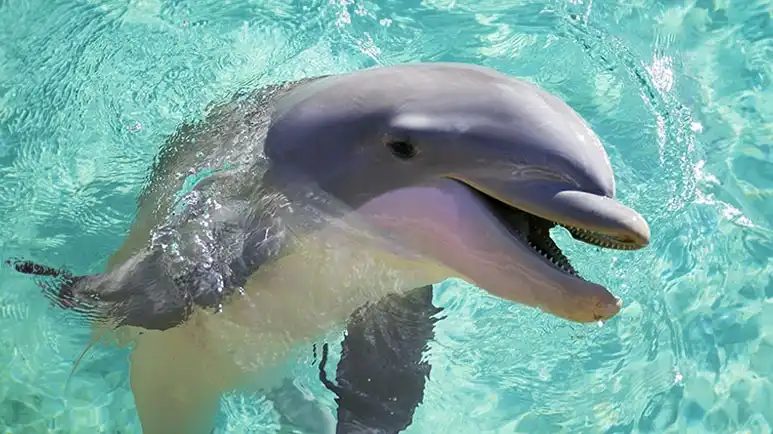Can This Unexpected Therapy Transform Marine Medicine?
Discover how pioneering fecal microbiota transplantations are not only saving Navy dolphins from severe gut diseases but also opening new avenues for non-antibiotic treatments in marine mammal health.

STORY AT-A-GLANCE
- A team of researchers recently published the results of a study on fecal microbiota transplantation (FMT) in Navy bottlenose dolphins
- The purpose of FMT is to replace good bacteria that has been killed or suppressed (often by the use of antibiotics), causing bad bacteria; the treatment has been used successfully in humans, pets, and now dolphins
- The researchers delivered eight FMT treatments to four dolphins by combining thoroughly screened feces from healthy donor dolphins; the recipient dolphins suffered no adverse effects
- One of the dolphins with diarrhea and lethargy due to viral enteritis and intravenous antibiotic use experienced a resolution of clinical signs and improvement in microbial diversity that lasted for 2 years after the study concluded
- The study results show that FMT can be done safely in dolphins and that the treatment can be very effective in animals with gastrointestinal disease and dysbiosis
According to a recent report by Phys.org,1 a team of scientists from the National Marine Mammal Foundation (NMMF), the U.S. Navy Marine Mammal Program and the Gilbert Lab at University of California San Diego (UCSD) School of Medicine, and Scripps Institution of Oceanography have successfully performed pioneering fecal microbiota transplantations on Navy bottlenose dolphins with gastrointestinal (GI) disease.
The scientists published their findings in February 2024 the Journal of Applied Microbiology.2 The study is the first of its kind in peer-reviewed literature. Prior to this research, there were only a handful of anecdotal cases of FMT use in marine mammals, and no standardized methods to safely screen donors, effectively administer the treatment, or monitor its effectiveness.
"This work is important to the veterinary community because it highlights a therapeutic option other than antibiotics to effectively treat gastrointestinal diseases in cetaceans, and describes a safe and effective protocol to alter the gut microbiome in animals with dysbiosis," study co-author Dr. Barbara Linnehan of the NMMF told Phys.org.
"It was important to us to be as thorough and careful as possible to ensure safety of the dolphins as our top priority.
In an effort to continually advance marine mammal medicine, we conducted this pilot project, pushing the boundaries in an area that had not been rigorously explored yet. There are numerous applications of FMTs beyond gastrointestinal disease, and this therapy holds so many future possibilities to investigate."3
Fecal Microbiota Transplantation Explained
For those who may not be aware, a fecal microbiota transplant (FMT) "is a procedure in which fecal matter, or stool, is collected from a tested donor, mixed with a saline or other solution, strained, and placed in a patient, by colonoscopy, endoscopy, sigmoidoscopy, or enema."4
The purpose of FMT is to replace good bacteria that has been killed or suppressed (often by the use of antibiotics), causing bad bacteria, specifically Clostridium difficile, or C. diff., to over-populate the colon. In humans, this infection causes a condition called C. diff. colitis, resulting in often debilitating, sometimes fatal diarrhea.
FMT has also shown promising results in human patients with many other digestive and auto-immune diseases, including irritable bowel syndrome (IBS), Crohn’s disease, and ulcerative colitis. It has also been used around the world to treat other conditions, although more research in other areas is needed.
Gastrointestinal disease affects many animals, including wild and managed dolphins, and FMT is a non-antibiotic option aimed at restoring beneficial gut flora in dysbiotic animals.
For information on how FMT is helping cure dogs and cats with a wide range of health issues, see Breakthrough Treatment Saves Pets From Euthanasia — Could It Help Yours Too?
Unfortunately, while FMT literature is plentiful in human medicine, there are only a handful of veterinary FMT studies published to date, across a variety of species.
Evaluating the Potential for FMT in Dolphins
Back to the present study. The concept resulted from a collaboration between Dr. Maureen Carroll, a veterinary internal medicine doctor and Linnehan, a marine mammal veterinarian. Carroll practices at the Angell Animal Medical Center in Boston, and frequently uses FMT to treat GI illness in dogs, with great results.
Linnehan had a Navy dolphin patient with dysbiosis (aka leaky gut), and she contacted Carroll for help developing an FMT protocol for use in dolphins, based on the human and veterinary standards.
The first Navy dolphin who was treated with FMT showed significant improvement and no longer required medication to manage GI illness. The success of that case led to the decision to more formally study the science behind the treatment in dolphins.
The team first measured the baseline bacterial composition of dolphin fecal samples prior to any FMT treatments.
"We compared the gut flora from recipient dolphins, with histories of early antibiotic use and gastrointestinal disease, to the gut flora of the healthy donor dolphins," Linnehan explained.
"With metagenomic analysis and comparison of these two groups of dolphins, we were interested to see if there was a distinct profile of a healthy dolphin gut microbiome versus a sick dolphin gut microbiome.
We were surprised at this stage to see that each dolphin varied widely, and there was not a clear pattern in species present or abundances of certain species of microbes that described sick vs. healthy dolphins — each dolphin was unique in microbial composition.
However, there were also common 'core' microbial members that were found across a majority of the dolphins, including an unexpected strain from the bacterial phylum Candidatus Kryptonia which is typically associated with geothermal spring environments."
No Adverse Effects and Successful Engraftment
Next, the researchers delivered eight FMT treatments trans-rectally to four recipient dolphins by combining thoroughly screened feces from healthy donor dolphins. There were no adverse effects in the recipients, and using "shotgun" metagenomics, the team was able to "observe the engraftment of new donor species to the recipient microbiome following FMTs," per Linnehan.
Engraftment is when the body accepts the novel microbial species from the donor(s) and begins producing new microbes, in this case, recipient–donor hybrid microbes.
"The degree of engraftment varied with each recipient dolphin," Linnehan said. "The dolphin who was outwardly ill at the beginning of the FMTs had the most dramatic response; he was successfully taken off of all medications and his appetite and energy returned to normal during the treatment course. The dolphin's improved clinical outcomes coincided with increased microbial diversity following the FMT treatment."
The study authors write:
"In one dolphin with diarrhea and lethargy due to viral enteritis and intravenous antibiotic use, the administration protocol and frequency described resulted in resolution of clinical signs and improvement in microbial diversity that lasted for 2 years after study conclusion."5
During the study, the researchers were also able to create an effective protocol for banking healthy donor dolphin feces for later use.
"We've shown that FMTs can be done safely in dolphins and that they can be very effective in animals with gastrointestinal disease and dysbiosis," said Linnehan.
"As antimicrobial resistance and antimicrobial stewardship are hot topics in the medicine world, having this non-antimicrobial option as a therapeutic tool can be helpful for marine mammal veterinarians. These tools and techniques could also be applied to wild animals in rehabilitation settings, to include at-risk, threatened, and endangered dolphins.
This study was just the beginning of exploring the use of FMT and microbial changes over time in the dolphin gut. As this was a small, clinical study that was disrupted by the global pandemic, future studies with larger sample sizes and over a longer time period are warranted.
It would also be interesting to investigate gut microbiome changes with different diet composition (i.e. different fish types), during different times of year, or fluctuations with other external factors like environmental water quality. There are also numerous opportunities to investigate FMT for treatment of non-GI disorders as documented in other species, including behavioral conditions or to improve longevity."6











